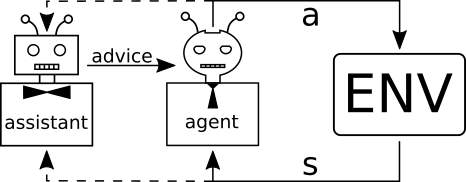Zero-Shot Assistance in Sequential Decision Problems
We consider the problem of creating assistants that can help agents solve new sequential decision problems, assuming the agent is not able to specify the reward function explicitly to the assistant. Instead of acting in place of the agent as in current automation-based approaches, we give the assistant an advisory role and keep the agent in the loop as the main decision maker. The difficulty is that we must account for potential biases of the agent which may cause it to seemingly irrationally reject advice. To do this we introduce a novel formalization of assistance that models these biases, allowing the assistant to infer and adapt to them. We then introduce a new method for planning the assistant's actions which can scale to large decision making problems. We show experimentally that our approach adapts to these agent biases, and results in higher cumulative reward for the agent than automation-based alternatives. Lastly, we show that an approach combining advice and automation outperforms advice alone at the cost of losing some safety guarantees.
PDF Abstract
